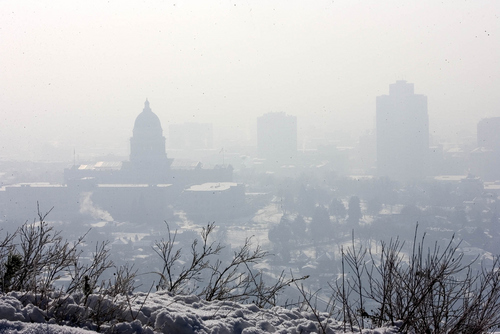This is an archived article that was published on sltrib.com in 2013, and information in the article may be outdated. It is provided only for personal research purposes and may not be reprinted.
The quality of the air along the Wasatch Front can become so bad, for so many different reasons, that government, business and individuals must whack at the problem with every club in their bags.
There is a good argument to be made that the new clean-up plan being floated by the Utah Air Quality Board does not go far enough. But that plan, now out for public comment, does recognize that the sources of the particulate matter that can do the most damage to our lungs are many and complex. They range from wood stoves, which recent studies have shown contribute a shocking percentage of the pollution found in the Salt Lake Valley's air, to such innocuous-seeming everyday items as hair sprays and hamburger joints.
Meanwhile, joining the battle on another flank, Salt Lake City Mayor Ralph Becker last week announced a plan to provide annual Utah Transit Authority passes to Salt Lake City residents for $360, or $30 a month. Compared to the normal $198 per month cost of the all-services pass — good on buses, TRAX, FrontRunner and the soon-to-open Sugar House Streetcar — the reasonable hope is that such a deep discount will actually convince more people to leave their cars at home and take public transit to work, to school and on shopping and entertainment jaunts around the UTA system.
Real and widely shared changes in behavior will be necessary if we are to reduce the air quality problems that strike our communities every winter and summer. That's the idea behind the discount pass program Becker proposed, and that the City Council should approve.
And that's the reason behind the attainment plan put forward by the Division of Air Quality. It would seek to reduce many sources of the emissions that are — or that, through a complicated process of chemistry and sunlight, become — a microscopic soot known as PM2.5.
PM2.5 particles are the kind that lodge in people's lungs and pose both acute and long-term threats. That kind of pollution is the reason why the winter air, which should be crisp and clear, is often so vile and heavy that school recesses are canceled, wood-burning banned and, ironically, many people fire up their high-polluting cars to drive to the clearer mountain air.
Proposed steps include small things, such as the sale of hair spray that is low in volatile organic compounds, to larger steps like banning flaring at oil refineries. Other good ideas would be free fare days on UTA when air quality is poor and further crackdowns on industrial sources.
Each of these steps, and more, are necessary to move toward a quality of air that it fit to breathe.



